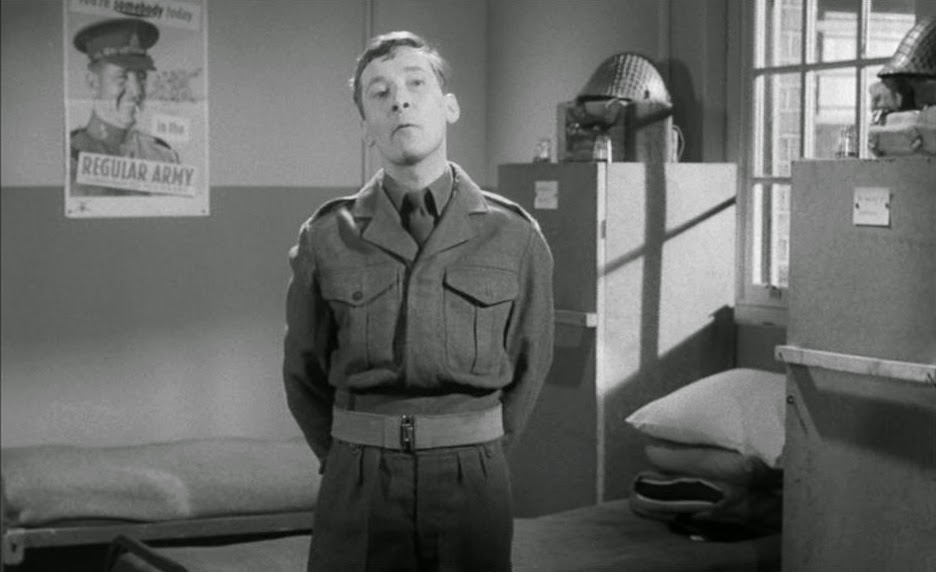Carry On Sergeant was the movie that started the Carry On series. As is often the case with the first movie in a long-running series this one differs a little from the later Carry On movies.
For one thing it’s rather more plot-driven and the two major plot strands are taken fairly seriously rather than being just an excuse for a series of gags.
The first thing viewers will notice is that while quite a few of the Carry On regulars are here they’re mostly in secondary roles. Only Kenneth Connor has a really major role. Charles Hawtrey, Kenneth Williams and Hattie Jacques are all consigned to relatively minor roles among the supporting cast.
Sergeant Grimshawe (William Hartnell) is about to retire from the army after many years training National Servicemen. In all those years not one platoon he has trained has won the coveted Champion Platoon trophy. He is determined that his final platoon will win that honour. It’s not just the glory - he also has fifty quid riding on the outcome and fifty quid in 1958 was a lot of money.
Unfortunately the new recruits in Able Platoon are a particularly sorry lot. Private Golightly (Charles Hawtrey) is chronically unable to keep his mind focused on any soldierly duties. Private Charlie Sage (Bob Monkhouse) is too busy thinking of his beautiful new wife Mary (Shirley Eaton) to give much attention to the military virtues. Private Horace Strong (Kenneth Connor) is a hypochondriac who spends most of his time in the office of the camp doctor, Captain Clark (Hattie Jacques). Private James Bailey (Kenneth Williams) is an effete snobbish university graduate who makes no attempt to disguise his contempt for the Army. The other misfits in Able Platoon include a guitar-playing beatnik. And then there’s Private Herbert Brown (Norman Rossington) who has failed the army’s basic training course on no less than three occasions and has the reputation of being the worst soldier anyone has ever encountered.
Only Private Heywood (Terence Longdon) seems to have potential but he lacks any real interest.
The other major sub-plot concerns Private Sage’s attempts to find a way to spend his wedding night with his new bride. He had received his call-up papers on his wedding day. It’s the sort of sub-plot that would have given rise to a great deal of risqué humour in the later Carry On movies but it’s handled surprisingly delicately here. But then this was 1958 and there was only so much one could get past the censor.
Service comedies were very popular in the 1950s and this movie adheres fairly closely to the established formula with the long-suffering sergeant having to deal with totally inept recruits. Carry On Sergeant does vary the formula just a little though. You expect the sergeant to be a martinet who tries to make the lives of the recruits as miserable as they’re making his life but that doesn’t happen here. Sergeant Grimshawe might be a martinet by inclination but in his desperation to win that fifty quid he’s decided to try a completely different approach. He’s going to treat these recruits with gentleness, sensitivity and understanding. He’s going to be a kindly father figure instead of a stern authority figure. He doesn’t really think it will work but fifty quid is fifty quid and it’s worth a shot.
You might think this would diminish the comic possibilities but it doesn’t. If anything it enhances them since Grimshawe’s exasperation with their bumbling incompetence is even more amusing when he’s trying so hard to be Mr Nice Guy.
William Hartnell had appeared in ITV’s hugely successful service comedy sitcom The Army Game, which had inspired a spin-off movie made by Hammer Films, I Only Arsked. Hartnell was not in the Hammer movie but its cast did include a couple of Carry On regulars, Bernard Bresslaw and Charles Hawtrey. Carry On Sergeant was clearly an attempt to jump on what seemed to be a very popular bandwagon. It proved to have been a shrewd movie. Carry On Sergeant was a major box-office hit.
Perhaps the biggest surprise in Carry On Sergeant is Kenneth Williams. The superciliousness is there, and in fact most of the elements that would make so immensely popular in the later movies of the series are there, but he had not yet learnt how to make the most of those elements. Most importantly he had not yet discovered the joys of total excessiveness. His performance is very subdued and very restrained. At times he almost seems to be trying to give a serious dramatic performance.
While the later Carry On regulars in this film are mostly in supporting roles it’s easy to see why they would soon be promoted to bigger roles in subsequent movies in the series. They’re the best things in this movie.
Despite a few mis-steps and a few slow moments this is still a very enjoyable movie and it has plenty of genuine laughs. It’s also a remarkably good-natured movie. The ending has a touch of sentimentality to it that you certainly don’t expect in the irreverent world of the Carry On movie. The series had not yet hit its stride but this was a promising start. Recommended.





No comments:
Post a Comment